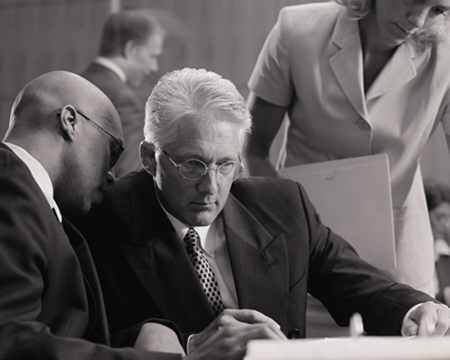In recent years, the field of jury consulting has witnessed a significant rise in popularity. Attorneys have come to recognize the importance of having a skilled professional by their side when it comes to selecting a jury. While some consultants rely on their gut instinct and years of experience, others are turning to data-driven techniques to enhance their decision-making process. This blog post explores the emergence of data-driven jury consulting and its implications for the legal profession.
To understand the role of jury consultants, it is crucial to grasp the essence of their work. Essentially, these consultants are hired by attorneys to assist in selecting a jury that is more likely to be sympathetic to their client's case. This involves a range of tasks, including analyzing potential jurors' backgrounds and attitudes, as well as observing their behavior during the selection process. The aim is to identify jurors who are receptive to the attorney's arguments and eliminate those who may harbor biases against their client.
Traditionally, the jury selection process heavily relied on the consultant's intuition and experience. Consultants would rely on their knowledge of the local community or their ability to interpret subtle cues from potential jurors. However, in recent years, there has been a shift towards incorporating data-driven techniques into jury consulting.
One of the key advantages of using data in jury consulting is the ability to identify patterns and trends that might not be immediately evident. By analyzing demographic data, consultants can gain insights into how certain groups of people are more likely to respond to specific arguments or evidence. Moreover, statistical modeling can be employed to predict which jurors are most likely to be sympathetic to the client's case.
Nevertheless, data-driven jury consulting presents its own set of challenges. One significant concern is the potential for bias. Just as human consultants can be influenced by their own biases and assumptions, data-driven models can also be subject to bias. For instance, if a model is trained on data that is skewed in some way or exclusive to certain types of cases, it may not accurately predict outcomes in other contexts.
Another challenge lies in the vast amount of available data. Consultants often face the dilemma of determining which data points are most relevant to their work. Furthermore, correctly interpreting the data can be demanding, particularly for those lacking statistical expertise.
Despite these challenges, many jury consultants believe that data-driven techniques offer a valuable tool for improving the jury selection process. By combining the insights of experienced consultants with the power of data analysis, they argue that more accurate predictions can be made, ultimately leading to better outcomes for their clients.
Looking ahead, the future of data-driven jury consulting appears promising. These techniques are expected to become more sophisticated and widespread as more data becomes available and consultants gain additional experience working with data-driven models. As a result, further improvements in the jury selection process can be anticipated.
However, it is crucial to remember that data should never be seen as a replacement for human intuition and experience. Even the most advanced data-driven models have limitations in predicting human behavior. Ultimately, the most effective jury consultants will be those who can combine the best of both worlds: the insights of experienced professionals and the power of data analysis.
In conclusion, data-driven jury consulting is a rapidly evolving field that is revolutionizing the approach attorneys take to the jury selection process. Although challenges exist, many consultants view data-driven techniques as a valuable tool for enhancing outcomes and achieving better results for their clients. As this field continues to develop, it will be intriguing to witness its evolution and the new insights it can provide.
This is the fifth in a series of five posts on jury selection and trial consultants. Other parts are linked here: Part 1, Part 2, Part 3, Part 4 & Part 5.
Other A2L Consulting articles related to jury selection, jury consulting and voir dire:
- Free Download: Storytelling for Litigators Guidebook
- Free E-Book: Getting Maximum Value from Jury Consultants
- 5 questions to always ask in voir dire
- 10 things every mock jury ever has said
- A2L voted #1 jury and trial consultants
- 5 things every jury needs from you
- They call it the practice of law, but nobody is practicing
- 6 secrets of the jury consulting business you should know






Leave a Comment